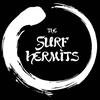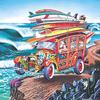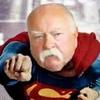SurfHermit

Joined: May 11, 2021
Posts: 10

|

Posted on May 25 2022 12:24 AM
To me it's something about the tone. For me (not a purist), I get everything from a tele and deluxe reverb, with the occasional recourse to a a bit of overdrive for sustain.
— The Surf Hermits on Bandcamp
2nd album Showdown out now on Sharawaji Records!
|
synchro

Joined: Feb 02, 2008
Posts: 4127
Not One-Sawn, but Two-Sawn . . . AZ.





|

Posted on May 25 2022 09:42 AM
SurfHermit wrote:
To me it's something about the tone. For me (not a purist), I get everything from a tele and deluxe reverb, with the occasional recourse to a a bit of overdrive for sustain.
I’m surprised that Teles are not more popular in Surf music. A a Tele and a Deluxe Reverb make for a very nice sound.
— The artist formerly known as: Synchro
When Surf Guitar is outlawed only outlaws will play Surf Guitar.
|
DrakeSequation

Joined: Nov 22, 2016
Posts: 77
PNW
|

Posted on Jul 18 2022 02:13 PM
The stereotypical surf sound ingredients are used sparingly or not at all by most tent pole surf groups. Dick Dale never used a tremolo. Man...Or Astro-Man? only use amp reverb. Almost no modern surf groups use horns but they were very common in first wave surf. Et cetera, et cetera.
The few things I think cannot be stripped away are:
1. clean tube amp (no, does not need to be a Fender amp)
2. Spring reverb
3. The “right” guitar (no, does not need to be a Fender guitar)
4. A good drum beat. Lindys should show up somewhere in there.
As for music creation, a few people have mentioned the Voice app. Another vote here. It is the best way to quickly document your musical idea before it goes out the other ear.
— Makai
Last edited: Jul 18, 2022 14:17:20
|
Redfeather

Joined: Jul 30, 2016
Posts: 854

|

Posted on Jul 18 2022 04:57 PM
Step one: Strip the rock out of the endeavor.
"Surf rock" is for the bands who don't really get the genre.
Step two: Get into the mindset of a young guy in the early 60s. "Rock" was around but it was the Chuck Berry/Bill Haley type, which was totally blues based and still fairly jazzy, with upright bass and drummers who were probably heaviley influenced by big bands and jazz. Modern drummers seem to usually get it wrong.
For me, it's essential to keep this stuff in mind when creating a song. I usually separate (mentally) my stuff into that which sounds historically accurate and that which is more contemporary sounding. But I always try to have authentic sounding drums. That's a big part of it for me-creating a good drum track.
Surf music is really all about the drummer.
|
synchro

Joined: Feb 02, 2008
Posts: 4127
Not One-Sawn, but Two-Sawn . . . AZ.





|

Posted on Jul 18 2022 08:56 PM
DrakeSequation wrote:
The stereotypical surf sound ingredients are used sparingly or not at all by most tent pole surf groups. Dick Dale never used a tremolo. Man...Or Astro-Man? only use amp reverb. Almost no modern surf groups use horns but they were very common in first wave surf. Et cetera, et cetera.
The few things I think cannot be stripped away are:
1. clean tube amp (no, does not need to be a Fender amp)
2. Spring reverb
3. The “right” guitar (no, does not need to be a Fender guitar)
4. A good drum beat. Lindys should show up somewhere in there.
As for music creation, a few people have mentioned the Voice app. Another vote here. It is the best way to quickly document your musical idea before it goes out the other ear.
I agree, completely. I’ve heard modern Surf recordings where the reverb was at 11, the sound was harsh, and the effects were overused. Even Dick Dale did not use heavy reverb all the time. Summer Surf is mellow, and not at all in line with his reputation as a ear drum shattering wildman. That enviable drip in Baja is prominent, but not harsh.
Surf was clean, tended to have reverb, or perhaps tremolo, but the common thread was a clean, bright guitar, out front. I see it as an outgrowth of Instrumental Rock, with roots in Duane Eddy, and perhaps some of Chuck Berry’s ideas. It bore more than a passing resemblance of the Twist phenomenon.
My own feeling on writing a Surf song, would be to simply find a melody that strikes you as upbeat. It can be Major or minor key, or even a 12 bar Blues. Your first effort doesn’t have t9 be your opus magnum, you can write a forgettable ditty, just to get started. I’d experiment with 12 Bar Blues, Major key melodies and harmonic minor keys. Most songs have their identity in some sort of hook, an interesting melodic or vocal device that either serves as the culmination of the song, or perhaps as an opening statement that builds anticipation. Hooks don’t have to be lyrics, they can be melodic/rhythmic.
Mostly, have fun.
— The artist formerly known as: Synchro
When Surf Guitar is outlawed only outlaws will play Surf Guitar.
|
Diabeetus

Joined: Jul 18, 2022
Posts: 7
Michigan
|

Posted on Jul 19 2022 08:20 AM
Just joined the site, so howdy everybody!!! Thought this was an interesting thread so wanted to get involved. As is the case with a lot of things, I think it's difficult to define surf and say what it is, because there are always exceptions to the rule. But at it's core (in my humble noob opinion):
- It's instrumental, and the guitar takes the place of a singer in terms of playing the melody.
-The melody is catchy (as is the case with most instrumental songs), but what I think sets it apart from other genres is that, as a whole, the songs are upbeat. Songs in Minor Keys give the songs more of an exotic sound/ feel instead of a depressing one.
-Certain techniques (the guitar twang, tremolo picking, use of the whammy bar, etc.) and effects (Reverb, tremolo) are also sprinkled in to give surf it's unique sound.
In terms of writing, +1 for the Voice app. Very handy for catching those ideas whenever/ wherever inspiration hits you.
So having just said/ written all of that, and thinking about it for a minute, to me the main (and most essential) thing in terms of writing is coming up with a good, strong melody. That's the foundation you build off of. From there we have all of our tools in our "surf guitar toolbox" to help turn that idea or melody into a fleshed out song.
|
synchro

Joined: Feb 02, 2008
Posts: 4127
Not One-Sawn, but Two-Sawn . . . AZ.





|

Posted on Jul 19 2022 10:13 AM
Diabeetus wrote:
Just joined the site, so howdy everybody!!! Thought this was an interesting thread so wanted to get involved. As is the case with a lot of things, I think it's difficult to define surf and say what it is, because there are always exceptions to the rule. But at it's core (in my humble noob opinion):
- It's instrumental, and the guitar takes the place of a singer in terms of playing the melody.
-The melody is catchy (as is the case with most instrumental songs), but what I think sets it apart from other genres is that, as a whole, the songs are upbeat. Songs in Minor Keys give the songs more of an exotic sound/ feel instead of a depressing one.
-Certain techniques (the guitar twang, tremolo picking, use of the whammy bar, etc.) and effects (Reverb, tremolo) are also sprinkled in to give surf it's unique sound.
In terms of writing, +1 for the Voice app. Very handy for catching those ideas whenever/ wherever inspiration hits you.
So having just said/ written all of that, and thinking about it for a minute, to me the main (and most essential) thing in terms of writing is coming up with a good, strong melody. That's the foundation you build off of. From there we have all of our tools in our "surf guitar toolbox" to help turn that idea or melody into a fleshed out song.
Great points.
The first challenge is in defining Surf. There are strong opinions about this, and they don’t always find universal acceptance among the members here. One man’s Surf might be another man’s heresy.
I have a different view of this, because I see Surf, and even early Rock n’ Roll as a treatment, and not strictly as a genre, unto itself. Let me elaborate.
In the early days of Rock n’ Roll, young artists would occasionally take Standards and play them as Rock. Blue Moon, was a ballad that was made into a Rock n’ Roll tune, with an over the top vocal treatment. Miserlou was an old, old song, but Dick Dale applied a treatment to it that made it sound as if it were a Surf tune. Some would argue that Walk Don’t Run is not Surf, but it is definitely played by a lot of Surf bands. The song was a Jazz tune, named for a sign in a New York subway, and based upon the changes of a ballad named Softly, As In A Morning’s Sunrise, but the Ventures made it into a Rock n’ Roll instrumental and it became very popular just before Surf hit the airwaves, and was covered by a lot of Surf bands. Interestingly, the changes to Walk Don’t Run are known as the Andalusian Cadence. This same set of changes shows up in Surf Rider, and is pretty common in Surf. These changes are thought to be ancient in origin, coming from Turkey, or perhaps the Levant.
Some Surf was based on 12 Bar Blues, amped up with a Twist beat. Once again, old changes, but a new treatment.
Speaking only for myself, I see Surf as a point along the timeline of Instrumental Rock n’ Roll. It came in the context of Honky Tonk, Rebel Rouser, Rumble, Walk, Don’t Run, and many other songs. Instrumentals became a lot less common on the charts, after the Beatles, and Surf slipped away from the public’s consciousness. It came roaring back, with Pulp Fiction, and suddenly Surf was back, and I think that it brought some other Instrumental Rock along with it.
My point isn’t to ignite a debate over what constitutes Surf Music, but instead to simply posit that Surf treatment works well with a variety of music. Play Ghost Riders In The Sky with reverb drip and some Pipeline style glasses and it becomes a great tune for a Surf band.
— The artist formerly known as: Synchro
When Surf Guitar is outlawed only outlaws will play Surf Guitar.
|
Diabeetus

Joined: Jul 18, 2022
Posts: 7
Michigan
|

Posted on Jul 19 2022 11:05 AM
synchro wrote:
I have a different view of this, because I see Surf, and even early Rock n’ Roll as a treatment, and not strictly as a genre, unto itself. Let me elaborate.
In the early days of Rock n’ Roll, young artists would occasionally take Standards and play them as Rock. Blue Moon, was a ballad that was made into a Rock n’ Roll tune, with an over the top vocal treatment. Miserlou was an old, old song, but Dick Dale applied a treatment to it that made it sound as if it were a Surf tune. Some would argue that Walk Don’t Run is not Surf, but it is definitely played by a lot of Surf bands. The song was a Jazz tune, named for a sign in a New York subway, and based upon the changes of a ballad named Softly, As In A Morning’s Sunrise, but the Ventures made it into a Rock n’ Roll instrumental and it became very popular just before Surf hit the airwaves, and was covered by a lot of Surf bands. Interestingly, the changes to Walk Don’t Run are known as the Andalusian Cadence. This same set of changes shows up in Surf Rider, and is pretty common in Surf. These changes are thought to be ancient in origin, coming from Turkey, or perhaps the Levant.
Some Surf was based on 12 Bar Blues, amped up with a Twist beat. Once again, old changes, but a new treatment.
Speaking only for myself, I see Surf as a point along the timeline of Instrumental Rock n’ Roll. It came in the context of Honky Tonk, Rebel Rouser, Rumble, Walk, Don’t Run, and many other songs. Instrumentals became a lot less common on the charts, after the Beatles, and Surf slipped away from the public’s consciousness. It came roaring back, with Pulp Fiction, and suddenly Surf was back, and I think that it brought some other Instrumental Rock along with it.
My point isn’t to ignite a debate over what constitutes Surf Music, but instead to simply posit that Surf treatment works well with a variety of music. Play Ghost Riders In The Sky with reverb drip and some Pipeline style glasses and it becomes a great tune for a Surf band.
Definitely a lot of good points, and I totally get what you're saying. Genre maybe isn't the best term to use, and your idea of "treatment" probably is closer to the mark. Or maybe even just "style". And I think that's true of not just early Rock n' Roll. You can take a song that has absolutely nothing to do with that type of music (as an example, The Force Theme/ Binary Sunset from Star Wars), apply the appropriate treatment, and you can make it sound like Surf, Punk, Heavy Metal, Country, etc.
Last edited: Jul 19, 2022 12:09:32
|
DrakeSequation

Joined: Nov 22, 2016
Posts: 77
PNW
|

Posted on Jul 19 2022 01:05 PM
synchro wrote:
One man’s Surf might be another man’s heresy.
I read this as “another man’s hearsay” and thought that was quite witty. It works either way.
— Makai
|
synchro

Joined: Feb 02, 2008
Posts: 4127
Not One-Sawn, but Two-Sawn . . . AZ.





|

Posted on Jul 19 2022 02:17 PM
Diabeetus wrote:
Definitely a lot of good points, and I totally get what you're saying. Genre maybe isn't the best term to use, and your idea of "treatment" probably is closer to the mark. Or maybe even just "style". And I think that's true of not just early Rock n' Roll. You can take a song that has absolutely nothing to do with that type of music (as an example, The Force Theme/ Binary Sunset from Star Wars), apply the appropriate treatment, and you can make it sound like Surf, Punk, Heavy Metal, Country, etc.
In the mid ‘70s, Ray Stevens recorded the old ballad, Misty, as a Country song, and it worked. Allegedly, this was in response to a bet, among some of the Nashville regulars, where he wagered he could make a Country hit out of any song they chose. They figured that Misty would stump him, but he prevailed.
Put a two-beat, some syrupy steel guitar work and a few banjo fills on Pipeline and it could sound Country. Flip it around, and play the theme from Bonanza with the right feel, and it wouldn’t sound out of place as Surf.
During the ‘60s, there was a lot of music produced that wasn’t, strictly speaking, Surf, but was definitely Surf inspired. There were any number of recordings which had strong melodic guitar lead, with copious reverb. There were Ventures copycats and larger ensemble recordings where the melody instrument was guitar. The song Pet Sounds, off The Beach Boys album of the same name, was a perfect example of this. It wasn’t a Surf recording, but there was definitely some Surf DNA.
The Marketts were another example. The band on tne recordings was comprised of LA session musicians and rne production values tended to be more in line with Easy Listening recordings of the time. But the lead guitar (probably Tommy Tedesco on a Tele) sounded quite similar to the mainstream of Surf recordings. Jack Nitzche’s The Lonely Surfer is another example, featuring none other than David Gates on Bass VI as the melodic instrument for about half of the songs.
DrakeSequation wrote:
synchro wrote:
One man’s Surf might be another man’s heresy.
I read this as “another man’s hearsay” and thought that was quite witty. It works either way.
DrakeSequation wrote:
synchro wrote:
One man’s Surf might be another man’s heresy.
I read this as “another man’s hearsay” and thought that was quite witty. It works either way.
I’m surprised that autocorrect didn’t do that. 
— The artist formerly known as: Synchro
When Surf Guitar is outlawed only outlaws will play Surf Guitar.
|
 https://sunb...
https://sunb...